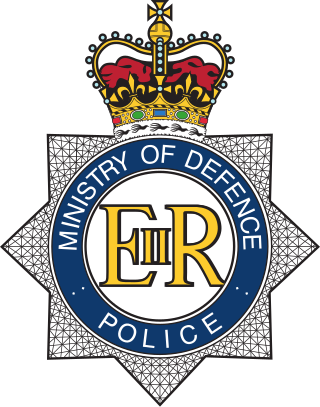
The Ministry of Defence is a ministerial department of the Government of the United Kingdom. It is responsible for implementing the defence policy set by the government and serves as the headquarters of the British Armed Forces.

Skynet is a family of military communications satellites, now operated by Babcock International on behalf of the United Kingdom's Ministry of Defence (MOD). They provide strategic and tactical communication services to the branches of the British Armed Forces, the British intelligence agencies, some UK government departments and agencies, and to allied governments. Since 2015 when Skynet coverage was extended eastward, and in conjunction with an Anik G1 satellite module over America, Skynet offers near global coverage.

Defence Intelligence (DI) is an organisation within the United Kingdom intelligence community which focuses on gathering and analysing military intelligence. It differs from the UK's intelligence agencies in that it is an integral part of a government department – the Ministry of Defence (MoD) – rather than a stand-alone organisation. The organisation employs a mixture of civilian and military staff and is funded within the UK's defence budget. The organisation was formerly known as the Defence Intelligence Staff (DIS), but changed its name in 2009.
Bowman is the name of the tactical communications system used by the British Armed Forces.

The United Kingdom's Strategic Command (StratCom), previously known as Joint Forces Command (JFC), manages allocated joint capabilities from the three armed services.
The Corsham Computer Centre (CCC) is an underground British Ministry of Defence (MoD) installation in Corsham, Wiltshire, built in the 1980s. According to the MoD, the centre "processes data in support of the Royal Navy". The centre has been similarly described by Des Browne in 2007, then Secretary of State for Defence, as a "data processing facility in support of Royal Navy operations".

RAF Rudloe Manor, formerly RAF Box, was a Royal Air Force station north-east of Bath, England, between the settlements of Box and Corsham, in Wiltshire. It was one of several military installations in the area and covered three dispersed sites. Parts of the site are now used by Defence Digital within the MoD Corsham complex; other areas are vacant and some have been sold, including the 17th-century manor house, Rudloe Manor.

The Defence Communication Services Agency (DCSA) was an agency of the United Kingdom Ministry of Defence responsible for the procurement and delivery of Communications and Information Services (CIS) to the defence community and related public and private sector bodies. The Agency was formed on 1 April 1998, bringing together a range of CIS organisations across all three services.

The Ministry of Defence (MoD) or Raksha Mantralay is charged with coordinating and supervising all agencies and functions of the government relating directly to national security and the Indian Armed Forces. The President of India is the ceremonial commander-in-chief of the armed forces of the country. The Ministry of Defence provides policy framework and resources to the armed forces to discharge their responsibility in the context of the country's defence. The Indian Armed Forces and Indian Coast Guard under the Ministry of Defence are primarily responsible for ensuring the territorial integrity of India.

The Dreadnought class is the future replacement for the Royal Navy's Vanguard class of ballistic missile submarines. Like their predecessors they will carry Trident II D-5 missiles. The Vanguard submarines entered service in the United Kingdom in the 1990s with an intended service life of 25 years. Their replacement is necessary for maintaining a continuous at-sea deterrent (CASD), the principle of operation behind the Trident system.

Defence Equipment and Support (DE&S) is a trading entity and joint-defence organisation within the UK Ministry of Defence. It began operating on 2 April 2007, following the merger of the MoD's Defence Procurement Agency and the Defence Logistics Organisation, under the Chief Executive Officer of Defence Equipment and Support.
Reserve Forces' and Cadets' Associations(RFCAs) are Crown bodies in the United Kingdom which give advice and assistance to the Defence Council, and to the Army, Royal Navy and RAF, on matters that concern reserves and cadets. They are contracted by the Ministry of Defence to provide services including management of the volunteer estate, employer support, cadets and youth and to establish and maintain links with the civilian community. Established in 1908 (known then as the County Associations), they are today organised as 13 regional associations, comprising voluntary members and a small full-time secretariat.

The Navy Command is the current headquarters body of the Royal Navy, and as of 2012 its major organisational grouping. It is a hybrid, neither a command, nor simply an installation. Royal Navy official writings describe Navy Command Headquarters both as a physical site, on Whale Island, Hampshire, a collective formed of the most senior RN officers, and as a budgetary grouping.

The Ministry of Defence Police (MDP) is a civilian special police force which is part of the United Kingdom's Ministry of Defence. The MDP's primary responsibilities are to provide armed security and counter terrorism services to designated high-risk areas, as well as uniformed policing and limited investigative services to Ministry of Defence property, personnel, and installations throughout the United Kingdom. The MDP are not military police. Service personnel often refer to the MDP by the nickname "MOD plod".

MOD Corsham is a Ministry of Defence establishment located between the towns of Corsham and Box in Wiltshire, England. Since 1998 the site's principal activities concern British Armed Forces and MOD information and communications technology and information warfare.

Brigadier Michael John Stone is a retired British Army officer, former Director of Information of the British Army and former chief information officer of the Ministry of Defence. Upon retirement from the army, Stone had a successful career in business, including roles as the Global Chair of National Security and Defence at KPMG and Global Managing Director of the Public Sector at IBM. In 2015, Stone made the UKtech50, where he was ranked the 12th most influential person in the UK IT Sector.
10 Signal Regiment is a signal regiment of the Royal Corps of Signals within the British Army.
13 Signal Regiment is a signal regiment of the Royal Corps of Signals within the British Army.
This is the structure of the British Armed Forces.













